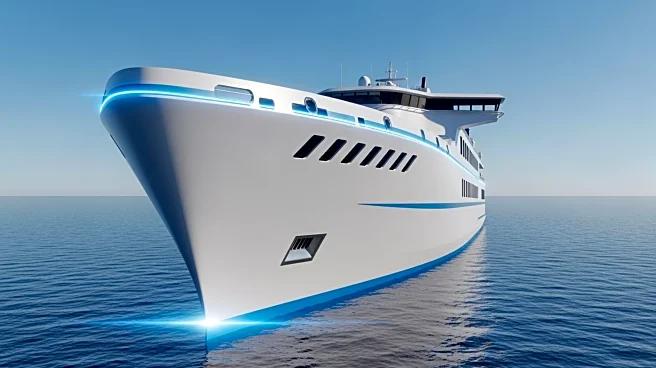What's Happening?
Air lubrication technology is being explored as a method to improve the energy efficiency of large ships, which are responsible for transporting over 80% of the world's goods and contribute to 3% of global
greenhouse gas emissions. The technology involves using compressors to press air under the hull, creating a bubble layer that reduces the ship's resistance in water. This method can lower drag by 10-20%, inspired by natural phenomena observed in penguins. However, the effectiveness of air lubrication systems is challenging to predict due to the complex interactions between hull design, air bubbles, and propeller selection. Researchers are using laboratory tests and advanced mathematical tools to better understand and optimize these systems.
Why It's Important?
Improving vessel efficiency through air lubrication has significant implications for reducing emissions in the shipping industry, a major contributor to global greenhouse gases. As the technology develops, it could lead to substantial fuel savings and environmental benefits. However, the complexity of integrating air lubrication systems with existing ship designs poses challenges. If successful, this technology could incentivize more shipping companies to adopt air lubrication, potentially leading to regulatory changes that include climate impact considerations. The adoption of air lubrication systems could also drive innovation in ship design, further enhancing efficiency and sustainability in maritime transport.
What's Next?
The future of air lubrication technology in shipping depends on continued research and development to optimize system performance. As more ships are built with air lubrication systems, guidelines for design and implementation may emerge, helping achieve desired efficiency gains. Regulatory incentives could encourage wider adoption, and companies may invest in retrofitting existing fleets. The shipping industry may see increased collaboration between researchers, shipbuilders, and regulatory bodies to address technical challenges and maximize the benefits of air lubrication technology.
Beyond the Headlines
The adoption of air lubrication systems could lead to broader shifts in the shipping industry, including changes in ship design standards and increased focus on sustainability. Ethical considerations may arise regarding the environmental impact of shipping and the responsibility of companies to reduce emissions. Long-term, air lubrication could contribute to global efforts to combat climate change by reducing the carbon footprint of maritime transport.









